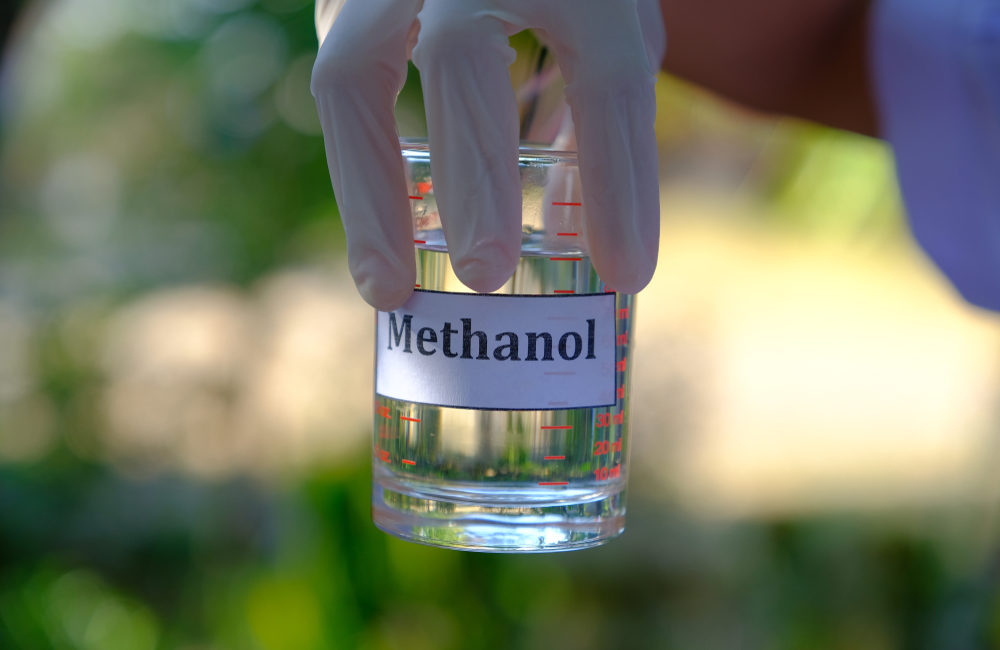Two distributors have agreed to recall Saniderm Advanced Hand Sanitizer at the guidance of the U.S. Food and Drug Administration (FDA). The product could contain a toxic chemical that is extremely dangerous to humans.
More than a week before the recall notice, the FDA contacted Eskbiochem recommending the company pull hand sanitizer products from the market. The company did not take action, which prompted the FDA to warn consumers and urge them not to use products manufactured by Eskbiochem. Now, two distributors have agreed to recall the hand sanitizer.
Hand Sanitizer Recalled due to Methanol Toxicity
According to the FDA announcement, Saniderm Products and UVT Inc. are voluntarily recalling Saniderm Advanced Hand Sanitizer due to the products possibly containing methanol (wood alcohol). Methanol is toxic with ingested or absorbed through the skin. Methanol is not an appropriate ingredient for hand sanitizers and should not be used in that capacity.
The FDA reports finding methanol in high levels, with some recalled products containing 81 percent methanol, and no ethyl alcohol.
The products subject to this recall are packaged in 1-liter plastic bottles. The label includes the words “Made in Mexico” and “Produced by: Eskbiocem SA de CV.” The following hand sanitizers are included in this recall:
- All-Clean (NDC: 74589-002-01)
- Esk Biochem (NDC: 74589-007-01)
- CleanCare NoGerm Advanced 75% Alcohol (NDC: 74589-008-04)
- Lavar 70 Gel (NDC: 74589-006-01)
- The Good Gel Antibacterial Gel (NDC: 74589-010-10)
- CleanCare NoGerm Advanced 80% Alcohol (NDC: 74589-005-03)
- CleanCare NoGerm Advanced 75% Alcohol (NDC: 74589-009-01)
- Saniderm Advanced (NDC: 74589-001-01)
- CleanCare NoGerm Advanced 80% Alcohol (NDC: 74589-003-01)
Anyone who has these products should stop use immediately. Consumers may be able to obtain a refund by returning the product to the place of purchase, or by contacting the manufacturer. The FDA warns consumers not to pour Saniderm hand sanitizer down the drain or toilet. Methanol should be disposed of appropriately, which generally requires a hazardous waste container.
Consumers can contact the FDA to find out how to dispose of Saniderm Advanced Hand Sanitizer. The FDA also encourages consumers to report adverse events through the FDA’s MedWatch Adverse Event Reporting program.
Dangers of Methanol Exposure
The FDA is urging consumers who may have been exposed to methanol in this products to talk to their healthcare provider immediately. Methanol poisoning is serious, but can be reversed if diagnosed quickly. Substantial exposure to methanol can cause uncomfortable or even dangerous symptoms, such as:
- Nausea
- Vomiting
- Headache
- Blurry vision
- Seizures
- Permanent blindness
- Permanent nervous system damage
- Coma
- Death
The dangers of methanol exposure in hand sanitizer include possible absorption through the skin, but also the danger of accidental ingestion. Young children, especially, are at risk for accidental exposure and poisoning. Additionally, people who drink hand sanitizer as a substitute for alcohol are also at a high risk of methanol poisoning.
What Consumers Should Know about Hand Sanitizer
With the ongoing COVID-19 pandemic, consumers are more concerned than ever about hand hygiene. The Centers for Disease Control and Prevention (CDC) continues to recommend hand washing, or using an alcohol-based hand sanitizer that contains at least 60 percent ethanol.
The FDA and CDC have warned consumers about false or misleading claims related to hand sanitizer, as well as counterfeit products that are completely ineffective. The CDC continues to encourage proper hand washing, including washing one’s hands for at least 20 seconds:
- After coughing, sneezing or nose blowing
- After going to the bathroom
- Before and after eating
- After handling food products
In lieu of hand-washing, the CDC recommends using hand sanitizer, but warns that it is not as effective as hand washing. The CDC says,
“Alcohol-based hand sanitizers can quickly reduce the number of microbes on hands in some situations, but sanitizers do not eliminate all types of germs.”
For example, hand sanitizers are less effective at fighting germs like norovirus, Clostridium difficile (C.diff) and Cryptosporidium.
Sources:
- https://www.fda.gov/drugs/drug-safety-and-availability/fda-advises-consumers-not-use-hand-sanitizer-products-manufactured-eskbiochem
- https://www.wsbtv.com/news/trending/fda-warns-consumers-avoid-these-nine-hand-sanitizers-fears-methanol-toxicity/WWZFDUW6Y5BCXALLRRXLFW4ULM/
- https://www.fda.gov/safety/medwatch-fda-safety-information-and-adverse-event-reporting-program
- https://www.cdc.gov/handwashing/show-me-the-science-hand-sanitizer.html
- https://www.badfoodrecall.com/illnesses/norovirus/
